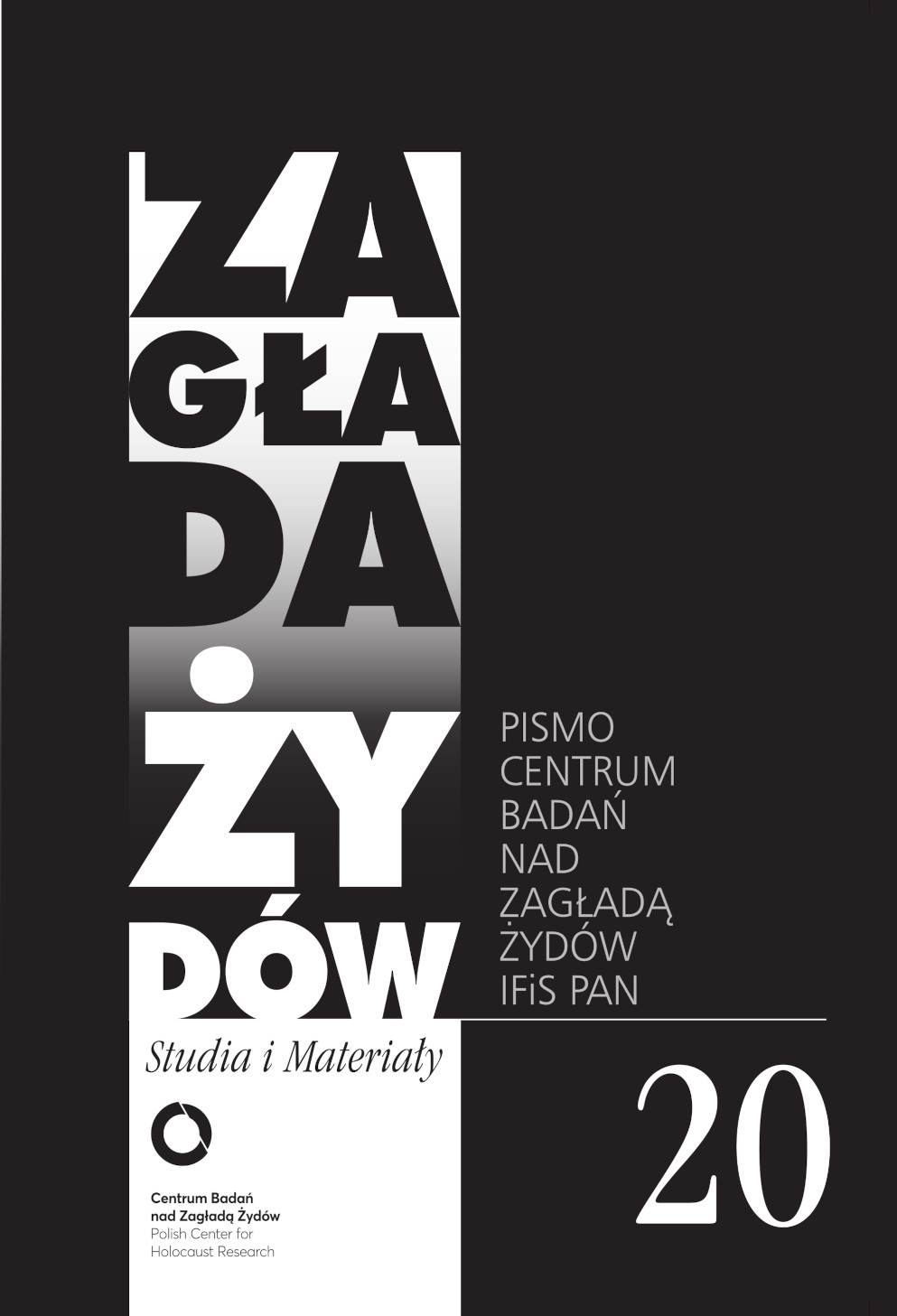Niezauważony potencjał? Historia mówiona w polskich badaniach nad Zagładą
Zagłada Żydów. Studia i Materiały, Nr 20 (2024), Strony: 499-509
Data zgłoszenia: 2024-07-12Data publikacji: 2024-12-17
 https://doi.org/10.32927/zzsim.1072
https://doi.org/10.32927/zzsim.1072
Abstrakt
Niniejszy tekst przedstawia miejsce Zagłady w relacjach oral history nagrywanych w Polsce w ciągu ostatnich dwudziestu lat. W tym celu sięga do metodologicznych korzeni tego nurtu, opisuje metodologiczną specyfikę i najważniejsze tematy obecne w polskiej historii mówionej, a także dokonuje przeglądu głównych ośrodków i środowisk, które zajmują się nagrywaniem i archiwizacją wywiadów. Następnie wskazuje, w jaki sposób zasób ten może być użyteczny dla badaczy Zagłady. W końcowej części Autorka zadaje pytanie o to, dlaczego mimo ogromnego potencjału zasoby historii mówionej, zwłaszcza zaś wywiady z polskimi świadkami, nie są wykorzystywane jako źródło historyczne przez polskich badaczy.
Słowa kluczowe
historia mówiona , Zagłada , polscy świadkowie , relacje Ocalałych
Bibliografia
Filipkowski Piotr, Pozagładowe historie mówione: nagrania, archiwa, sposoby lektury, „Zagłada Żydów. Studia i Materiały” 2013, nr 9.
Google Scholar
Gałęziowski Jakub, Oral History and Biographical Method. Common Framework and Distinctions Resulting from Different Research Perspectives, „Przegląd Socjologii Jakościowej” 2019, t. 15, nr 2.
Google Scholar
Gałęziowski Jakub, Czas na analizę! O potrzebie seminariów historii mówionej, „Wrocławski Rocznik Historii Mówionej” 2022, t. 12.
Google Scholar
Gałęziowski Jakub, Kaźmierska, Kaja, Together or apart? Doing biographical research and oral history in an interdisciplinary context, „Current Sociology” 2023, t. 71, nr 4.
Google Scholar
Kałwa Dobrochna, 3R: Historia mówiona w polskich badaniach dziejów najnowszych, „Wrocławski Rocznik Historii Mówionej” 2017, nr 7.
Google Scholar
Kushner Tony, Świadectwa Holokaustu, etyka i problem reprezentacji, „Wrocławski Rocznik Historii Mówionej” 2018, nr specjalny.
Google Scholar
Metoda biograficzna w socjologii. Antologia tekstów, red. Kaja Kaźmierska, Kraków: Nomos, 2012.
Google Scholar
Portelli Alessandro, Co stanowi o odmienności historii mówionej, „Wrocławski Rocznik Historii Mówionej” 2018, nr specjalny.
Google Scholar
Wylegała Anna, Kolekcja „Polacy na Wschodzie” po latach – rewizyta metodologiczna [w:] Polacy na Wschodzie. Historie mówione, red. Dominik Czapigo, Warszawa: Ośrodek Karta, 2023.
Google Scholar
Licencja
Prawa autorskie (c) 2024 Autor&"Zagłada Żydów. Studia i Materiały"

Utwór dostępny jest na licencji Creative Commons Uznanie autorstwa 4.0 Międzynarodowe.
https://creativecommons.org/licenses/by/4.0
Czasopismo publikowane jest w standardzie Diamond Open Access na licencji CC-BY-4.0 Deed - Uznanie autorstwa 4.0 Międzynarodowa - Creative Commons
Inne teksty tego samego autora
- Anna Wylegała, (Nie)pamięć na gruzach. Zagłada Żydów żółkiewskich w świadomości nowych mieszkańców miasta , Zagłada Żydów. Studia i Materiały: Nr 7 (2011)
- Anna Wylegała, Omer Bartov, Anatomy of a Genocide. The Life and Death of a Town Called Buczacz, New York: Simon & Schuster, 2018, 416 s. , Zagłada Żydów. Studia i Materiały: Nr 15 (2019)
- Anna Wylegała, Ukraińskie dyskusje o Holokauście: wokół książki Omera Bartova , Zagłada Żydów. Studia i Materiały: Nr 7 (2011)
- Anna Wylegała, Recenzja: John-Paul Himka, Ukrainian Nationalists and the Holocaust: OUN and UPA’s Participation in the Destruction of Ukrainian Jewry, 1941–1944, seria „Ukrainian Voices”, t. 12, Stuttgart: ibidem, 2021, 540 s. , Zagłada Żydów. Studia i Materiały: Nr 18 (2022)
Podobne artykuły
- Dariusz Libionka, Jacek Leociak, 75. rocznica akcji „Reinhardt” , Zagłada Żydów. Studia i Materiały: Nr 13 (2017)
- Piotr Filipkowski, Między historią mówioną, psychologią ocalenia a traumą drugiego pokolenia. Wokół książek Mikołaja Grynberga Ocaleni z XX wieku i Oskarżam Auschwitz. Opowieści rodzinne , Zagłada Żydów. Studia i Materiały: Nr 11 (2015)
- Alina Skibinska, „Ludzie opowiadali rzeczy potworne o tym, co się tam działo”. Dwa świadectwa Zagłady – Adama Ulricha z Zakrzówka i Stanisława Ż(Rz)emińskiego z Łukowa , Zagłada Żydów. Studia i Materiały: Nr 13 (2017)
- Dariusz Libionka, Jan Grabowski, Anatomia donosu ks. Stanisława Trzeciaka na ks. Tadeusza Pudra , Zagłada Żydów. Studia i Materiały: Nr 13 (2017)
- Dariusz Libionka, Barbara Engelking, Od Redakcji , Zagłada Żydów. Studia i Materiały: Nr 20 (2024)
- Małgorzata Melchior, Zagłada i stosunki polsko – żydowskie w opracowaniach socjologicznych. , Zagłada Żydów. Studia i Materiały: Nr 1 (2005)
- Jan Tomasz Gross, Czy Zagłada jest ich historią, czy naszą? (Plaidoyer w przedmiocie ustanowienia w Polsce miejsca pamięci poświęconego Zagładzie) , Zagłada Żydów. Studia i Materiały: Nr 13 (2017)
- Piotr Filipkowski, Pozagładowe historie mówione: nagrania, archiwa, sposoby lektury , Zagłada Żydów. Studia i Materiały: Nr 9 (2013)
- Jakub Petelewicz, „Kresy Wschodnie pod okupacją sowiecką 1939–1941; stosunki ukraińsko-polsko-żydowskie, życie społeczne i wzajemne relacje” , Zagłada Żydów. Studia i Materiały: Nr 3 (2007)
- Jacek Leociak, Adam Mazur, Artur Żmijewski, „Berek jest głosem o niemocy wobec okrucieństwa; pragnieniem, by Zagłada się nie wydarzyła”. Z Arturem Żmijewskim rozmawiają Jacek Leociak i Adam Mazur , Zagłada Żydów. Studia i Materiały: Nr 17 (2021)
1 2 3 4 5 6 7 8 9 10 11 12 13 14 15 16 17 18 19 20 21 22 23 24 25 26 27 28 29 30 31 32 33 34 35 36 37 38 39 40 41 42 43 44 45 46 47 48 49 50 > >>
Możesz również Rozpocznij zaawansowane wyszukiwanie podobieństw dla tego artykułu.
 English
English
 Język Polski
Język Polski



 https://orcid.org/0000-0001-5575-4123
https://orcid.org/0000-0001-5575-4123





